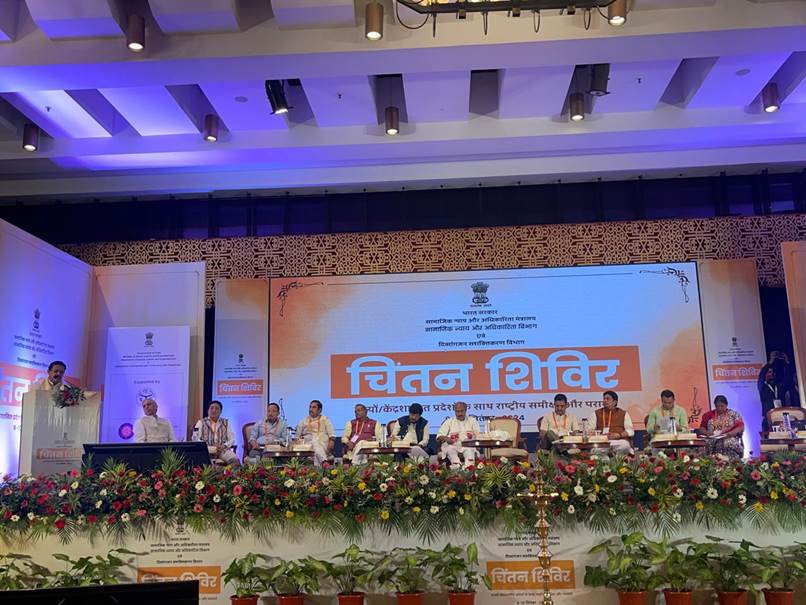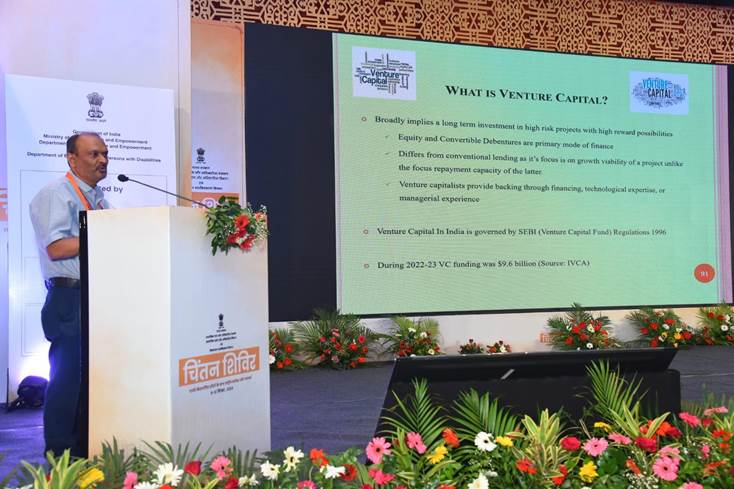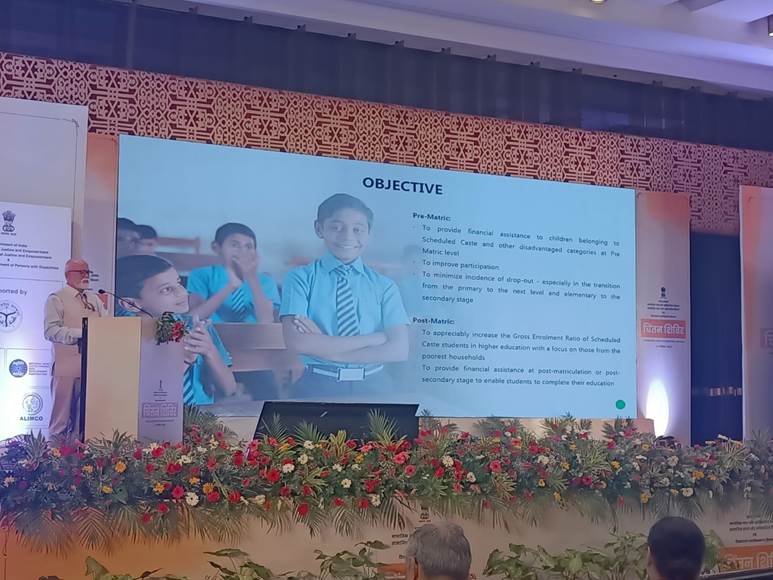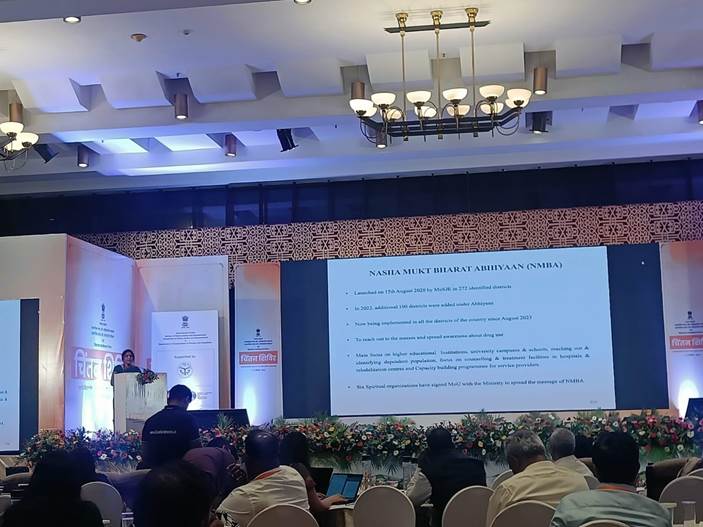Ministry of Social Justice and Empowerment organises Chintan Shivir Day 1 Focuses on Programs for Marginalized Communities
Ministry of Social Justice and Empowerment organises Chintan Shivir Day 1 Focuses on Programs for Marginalized Communities
The Ministry of Social Justice and Empowerment, Government of India today organised a two-day Chintan Shivir in Agra. The opening day commenced in presence of Dr. Virendra Kumar, Union Minister for Social Justice and Empowerment, along with Ministers of State Shri B. L. Verma and Shri Ramdas Athawale, with a key focus on the review of programs aimed at the social and economic empowerment of marginalized and vulnerable communities across the nation. The conference, attended by Ministers and senior officials from Social Justice/Social Welfare Departments of all States and Union Territories, is a platform for reviewing government initiatives and strategizing future policies for marginalized communities.

The event started with focus on Economic Empowerment:
The Economic Empowerment Session highlighted the government’s strategic programs to uplift marginalized sections of society, such as Scheduled Castes (SCs), Other Backward Classes (OBCs), Economically Backward Classes (EBCs), De-Notified Tribes (DNTs), and Persons with Disabilities (PwDs).
This session featured comprehensive presentations on schemes like Pradhan Mantri Anusuchit Jati Abhyuday Yojana (PM-AJAY), which encompasses various sub-programs like the Pradhan Mantri Adarsh Gram Yojana (PM-AGY) and Grant-in-Aid to States/Districts, aimed at empowering SC communities. The scheme for Construction/Repair of Hostels was also discussed, focusing on improving residential infrastructure for SC students.
Other key highlights included the Scheme for Implementation of Rights of Persons with Disabilities Act, 2016 (SIPDA), which ensures accessibility and inclusion for persons with disabilities, and Pradhan Mantri Dakshata aur Kushalata Sampann Hitgrahi Yojana (PM-DAKSH), focusing on skill development and vocational training. The session also covered the Venture Capital Fund for SC Entrepreneurs, a program that promotes entrepreneurship among SC communities by providing financial assistance and capital for start-up ventures.

This session underscored the government’s commitment to building financial independence among marginalized communities, enabling them to become active participants in India’s economic growth.
Followed by focus on Educational Empowerment:
The Educational Empowerment Session highlighted the critical role of education in uplifting marginalized communities and fostering upward social mobility. Presentations focused on scholarships and initiatives designed to remove barriers to education for vulnerable sections.
The session showcased the Post-Matric Scholarship Scheme for SCs and Pre-Matric Scholarship Schemes for SCs and Others, which provide financial assistance to the eligible students at various levels of education, ensuring that no student is deprived of education due to financial constraints. The National Scholarship Portal (NSP), a digital platform providing easy access to various scholarships for students across the country, was also discussed.

Other important initiatives included SHREYAS (Scholarships for Higher Education for Young Achievers Scheme), which provides scholarships for SCs and OBCs pursuing higher education in select institutions. Additionally, scholarship schemes for students with disabilities were presented, ensuring educational opportunities for students with special needs. The session also covered the PM Young Achievers Scholarship Award Scheme for Vibrant India (PM-YASASVI) and the Scheme for Residential Education for Students in High Schools in Targeted Areas (SRESHTA), which provides residential schooling for high school students from targeted areas.
The session emphasized the government’s commitment to ensuring access to quality education for all, thus promoting long-term empowerment and social integration.
Focus on Social Empowerment
The final session of the day, Social Empowerment, was dedicated to reviewing the progress of key social welfare initiatives aimed at protecting and promoting the rights of vulnerable communities.
The session addressed the Implementation Status of the Protection of Civil Rights Act, 1955, and the Scheduled Caste and Scheduled Tribes (Prevention of Atrocities) Act, 1989, which provide legal safeguards to prevent atrocities and discrimination against SCs and STs. Discussions also centered around the National Action Plan for Mechanized Sanitation Ecosystem (NAMASTE), a flagship initiative aimed at eradicating manual scavenging and promoting the welfare of sanitation workers.
The Atal Vayo Abhyuday Yojana (AVYAY), a program focused on the well-being and dignified aging of senior citizens, was also highlighted. The scheme provides financial assistance, healthcare, and social security to the elderly. In addition, the session covered the Assistance to Disabled Persons for Purchase of Fitting Devices (ADIP), which provides essential aids and appliances to persons with disabilities, enhancing their mobility, functionality, and independence.
Further discussions focused on the National Action Plan on Drug Demand Reduction (NAPDDR) and Nasha Mukt Bharat Abhiyaan (NMBA), which aim to combat substance abuse and drug addiction through awareness campaigns, rehabilitation, and preventive measures.

Lastly, the Deendayal Divyangjan Rehabilitation Scheme (DDRS) was highlighted, which provides comprehensive rehabilitation services to persons with disabilities through a network of NGOs and government bodies.
This session reinforced the government’s holistic approach to social empowerment, ensuring that legal, social, and welfare frameworks are in place to protect marginalized communities and provide them with opportunities for a better future.
The day concluded with a vibrant Cultural Programme, celebrating India’s diversity and rich cultural heritage and thus reflecting the government’s unwavering commitment to the socio-economic and educational empowerment of marginalized communities.